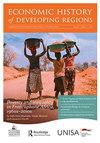Political economy of development in the Arab republics: The state and socio-economic coalitions
IF 0.8
Q1 HISTORY
引用次数: 0
Abstract
ABSTRACT The question of socio-economic underdevelopment in the Arab region has been a perennial theme in development studies. While some scholars highlight the long durée effect of the Ottoman institutional legacy, others place the blame on the legacy of exploitation and expropriation of the colonial practices in the region. The article reaches beyond the two accounts (albeit departing from the colonial economic basis) and brings out the agency of the post-colonial elites who altered the socio-economic foundation of the political class and transformed processes of capital accumulation and labour commodification. I argue that the processes of state-building accompanied by social engineering measures represented a ‘critical juncture’ that impinged on state autonomy and its bureaucratic capacity and left an indelible imprint on development strategies. The article unpacks three mechanisms that proved consequential for economic policy outcomes: (1) the degree of elite autonomy to formulate policies, (2) the power of social classes to contest economic policies, and (3) the capacity of state bureaucracy to implement policies and allocate resources. A critical political economy perspective, that reaches beyond the reification of the state and examines the interaction between ‘elite deals’ and ‘social bargains’, offers a nuanced account for varied development records across the region.阿拉伯共和国发展的政治经济:国家和社会经济联盟
阿拉伯地区的社会经济不发达问题一直是发展研究的一个主题。虽然一些学者强调了奥斯曼制度遗产的长期影响,但另一些学者则将责任归咎于该地区殖民做法的剥削和征用。这篇文章超越了这两种说法(尽管脱离了殖民地的经济基础),揭示了后殖民精英的能动性,他们改变了政治阶层的社会经济基础,改变了资本积累和劳动力商品化的过程。我认为,伴随着社会工程措施的国家建设过程代表了一个“关键时刻”,它影响了国家自治及其官僚能力,并在发展战略中留下了不可磨灭的印记。文章揭示了三种对经济政策结果具有重要影响的机制:(1)精英制定政策的自主权程度,(2)社会阶层竞争经济政策的权力,以及(3)国家官僚机构执行政策和分配资源的能力。一个批判性的政治经济学视角,超越了国家的具体化,考察了“精英交易”和“社会交易”之间的互动,为该地区不同的发展记录提供了微妙的解释。
本文章由计算机程序翻译,如有差异,请以英文原文为准。
求助全文
约1分钟内获得全文
求助全文

 求助内容:
求助内容: 应助结果提醒方式:
应助结果提醒方式:


